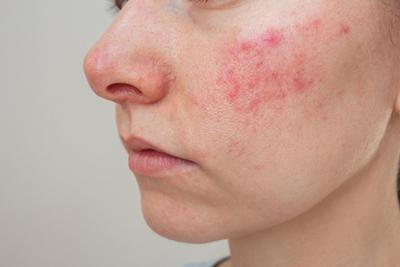If you have not already registered with our patient portal you can e-mail [email protected] and we will send the instructions with your security code within 1-2 business days.
Understanding Rosacea: Causes, Symptoms, and Treatments

- posted: Jul. 24, 2024
Receive specialized, professional care for rosacea at the renowned Cary Dermatology Center & Cary Aesthetic Center in Cary, NC. Our experienced dermatologists and aestheticians are dedicated to providing comprehensive and effective treatment options to manage and alleviate rosacea symptoms.
What Is Rosacea?
When we think of skin discoloration, most of us picture discolored patches of skin that appear noticeably darker. However, skin discoloration doesn’t always work that way. Such is the case with the condition known as rosacea.
For those unfamiliar with rosacea, it’s a condition mainly characterized by skin on the face appearing redder than normal. It can cause prolonged and noticeable flushing. Notably, the flushing caused by rosacea may not always create noticeable redness. In some cases, skin affected by rosacea may also develop a shade closer to pink.
The main symptom of rosacea also manifests differently in people with darker skin tones. Instead of causing redness or pinkness, rosacea may cause the affected individual’s skin to appear browner. Skin discoloration in Cary, NC, is not the only issue caused by rosacea. People with this condition may also develop bumps and rashes on their skin, which may resemble an acne breakout. Due to rosacea, blood vessels also become more prominent. The ones around your nose and cheeks may become more visible and larger.
Other rosacea symptoms include irritation and swelling around the eyes and thicker skin.
While the exact cause of rosacea remains unclear, experts agree it is related to inflammation. The cause of the inflammation related to rosacea is difficult to pin down, but many believe it could be linked to genetics and environmental factors. An infection may also play a role in your case of rosacea.
What Are the Treatment Options for Rosacea?
If you have rosacea, it is highly recommended that you work closely with a dermatologist. The key to minimizing rosacea symptoms is identifying your triggers; your dermatologist can help you avoid them. Furthermore, dermatologists can help by improving your skincare habits. They can teach you new washing habits and recommend products that are better for your skin.
If that approach to treating rosacea doesn’t provide the desired results, your dermatologist may prescribe some medication. Topical gels and creams can soothe the symptoms of rosacea. You may also be given oral antibiotics based on your symptoms.
Laser therapy may also be used to treat rosacea. Your dermatologist may suggest that treatment method if you have enlarged blood vessels.
Schedule rosacea treatment at Cary Dermatology Center & Cary Aesthetic Center in Cary, NC, by calling (919) 467-8556.

- posted: Jul. 24, 2024
Receive specialized, professional care for rosacea at the renowned Cary Dermatology Center & Cary Aesthetic Center in Cary, NC. Our experienced dermatologists and aestheticians are dedicated to providing comprehensive and effective treatment options to manage and alleviate rosacea symptoms.
What Is Rosacea?
When we think of skin discoloration, most of us picture discolored patches of skin that appear noticeably darker. However, skin discoloration doesn’t always work that way. Such is the case with the condition known as rosacea.
For those unfamiliar with rosacea, it’s a condition mainly characterized by skin on the face appearing redder than normal. It can cause prolonged and noticeable flushing. Notably, the flushing caused by rosacea may not always create noticeable redness. In some cases, skin affected by rosacea may also develop a shade closer to pink.
The main symptom of rosacea also manifests differently in people with darker skin tones. Instead of causing redness or pinkness, rosacea may cause the affected individual’s skin to appear browner. Skin discoloration in Cary, NC, is not the only issue caused by rosacea. People with this condition may also develop bumps and rashes on their skin, which may resemble an acne breakout. Due to rosacea, blood vessels also become more prominent. The ones around your nose and cheeks may become more visible and larger.
Other rosacea symptoms include irritation and swelling around the eyes and thicker skin.
While the exact cause of rosacea remains unclear, experts agree it is related to inflammation. The cause of the inflammation related to rosacea is difficult to pin down, but many believe it could be linked to genetics and environmental factors. An infection may also play a role in your case of rosacea.
What Are the Treatment Options for Rosacea?
If you have rosacea, it is highly recommended that you work closely with a dermatologist. The key to minimizing rosacea symptoms is identifying your triggers; your dermatologist can help you avoid them. Furthermore, dermatologists can help by improving your skincare habits. They can teach you new washing habits and recommend products that are better for your skin.
If that approach to treating rosacea doesn’t provide the desired results, your dermatologist may prescribe some medication. Topical gels and creams can soothe the symptoms of rosacea. You may also be given oral antibiotics based on your symptoms.
Laser therapy may also be used to treat rosacea. Your dermatologist may suggest that treatment method if you have enlarged blood vessels.
Schedule rosacea treatment at Cary Dermatology Center & Cary Aesthetic Center in Cary, NC, by calling (919) 467-8556.
Cary Dermatology Center and Cary Aesthetic Center
101 SW Cary Parkway Suite 210,
Cary, NC 27511
Contact Us
We encourage you to contact us whenever you have an interest or concerns.
Address
101 SW Cary Parkway Suite 210,
Cary, NC 27511
Please call (919) 467-8556.
You can now also text our office at (919) 467-8556
Monday
7:00 am - 5:00 pm
Tuesday
7:00 am - 5:00 pm
Wednesday
7:00 am - 5:00 pm
Thursday
7:00 am - 5:00 pm
Friday
7:00 am - 5:00 pm
Saturday
Closed
Sunday
Closed
